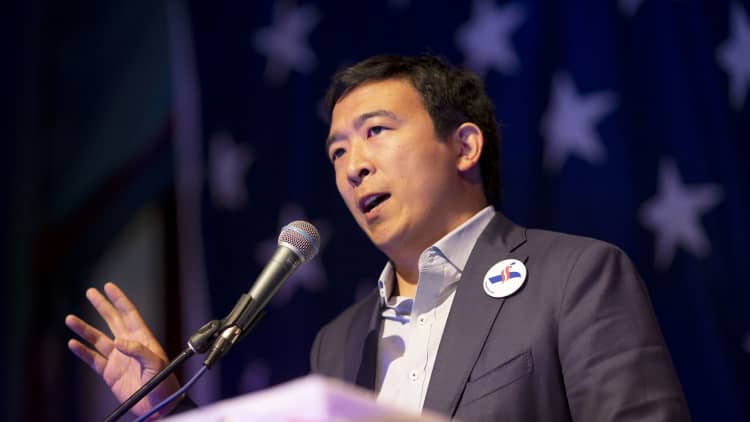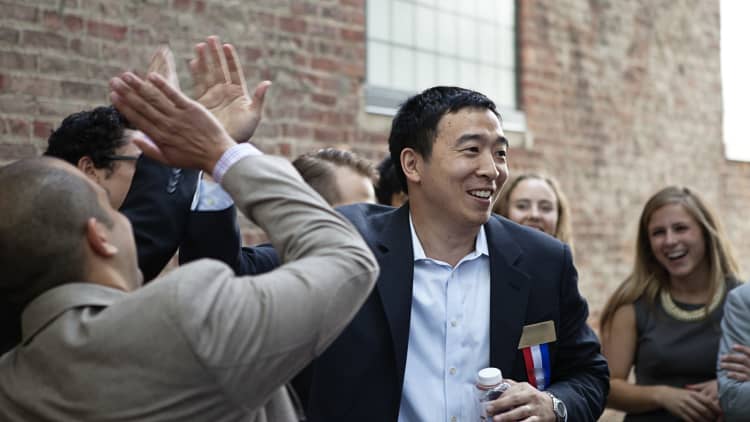Andrew Yang decided to run for president because Donald Trump was elected to the office.
"I found that to be a major red flag about the direction of our country. I see him as an emblem to the accelerating disintegration of our way of life," Yang, 44, tells CNBC Make It from his New York City campaign headquarters in February. (A White House spokesperson declined to comment.)
Yang is 5 feet, 11 inches tall. On the day CNBC interviews him, he has on navy pants, a navy blazer and a blue button-down shirt. If you scroll through his Instagram feed, it seems to be the Yang uniform. There are a few shots where he's wearing jeans, but Yang is not flashy.
He smiles a lot and throws his arm around people casually and comfortably.
His campaign headquarters is one large room with high ceilings, desks around the perimeter, a gray couch in one corner and a handful of motivational signs on the walls. One of those signs is, of course, a "Yang for President" banner. Another — printed in the same dark blue, white and red as the campaign banner — has one word: "Math."
"One of my supporters said something to me — that the opposite of Donald Trump is an Asian man who likes math," Yang tells CNBC Make It. "We made 'math' signs and then people just hold up 'math' signs. … And so we think that's a great sign of the direction we need to go and how this campaign is different."
The campaign has even started selling "math" baseball caps. As of Wednesday, the first 500 $50 limited-edition hats were sold out.
Just above the "Math" sign in Yang's campaign headquarters, there is a printed sign with a quote from a New York Times article: "Andrew Yang is a longer-than-long shot for the White House."
Yang relishes the label. "We love the characterization," he says. "It shows where we started and ... how much we're going to shock the world." But he has made such a splash of late that, on Tuesday, FiveThirtyEight editor-in-chief Nate Silver tweeted, "Yang has crossed the threshold where we consider him a major candidate."
Whatever his position among the many Democratic hopefuls, Yang does have an entrepreneurial track record that demonstrates his capacity to produce results. Yang was previously CEO of test-prep education company Manhattan GMAT, which industry leader Kaplan bought for an undisclosed amount in 2009. He also founded Venture for America, a New York City-based nonprofit organization that trains entrepreneurs in a two-year fellowship program.
In the summer of 2017, he says: "I told my wife, 'Hey, it looks like I am going to run for president.' And then she said, 'That's great, pass the salt' or whatever, you know and just went on with our dinner. ... We've been together for a long time, and I am a serial entrepreneur. I started a multimillion-dollar organization out of thin air ... so she's kind of accustomed to taking on big challenges."
The American dream
Yang has already lived some version of the American dream.
He was born to Taiwanese immigrant parents in Schenectady, New York, a small city halfway between New York City and the Canadian border with a population of about 66,000 and a median income around $43,000, according to 2017 Census Bureau data.
"I went to Brown University and Columbia for law school, was an attorney for five months before trying my hand as an entrepreneur. My first dot-com business flopped, but then I worked at a series of other companies." Yang later moved on to Manhattan GMAT and Venture for America.
The goal of Venture for America, in addition to giving recent college graduates experience preparing them to become entrepreneurs, is to bring college talent to cities often overlooked — like Cleveland, New Orleans and Pittsburgh — for big metropolitan hubs on the East and West coasts, like New York and San Francisco.
For his work with Venture for America, Yang was named a "Champion of Change," and in 2015 he was named a "Presidential Ambassador for Global Entrepreneurship" by former President Barack Obama's administration.
Venture for America also gave Yang firsthand exposure to the rapidly changing economy.
"I started Venture for America to help create thousands of jobs around the country and realized that we were automating away many more jobs than we were creating," Yang tells CNBC Make It.
Free cash as a solution to automation
Whether Yang's assessment is accurate is debatable: Kai-Fu Lee, dubbed by the CBS program "60 Minutes" as the oracle of artificial intelligence, said 40 percent of jobs in the world will be displaced in 15 years, according to an article published in January. And a November 2017 report from consultant McKinsey & Co. estimates 400 million jobs (15 percent) around the world will be displaced by automation by 2030, assuming a middle-paced rate of adoption of automation technology. At the same time, 8 to 9 percent of the jobs demanded in 2030 will be in occupations that have never existed before, McKinsey says.
However, assuming governments and companies take clear steps to "boost" job creation for the next 15 years, what McKinsey calls the "set-up" scenario, it estimates job displacement will roughly equal creation. "The United States ... could also face significant workforce displacement from automation by 2030, but their projected future growth — and hence new job creation — is higher," the report says. "The United States has a growing workforce, and in the step-up scenario, with innovations leading to new types of occupations and work, it is roughly in balance."
As the MIT Technology Review, which compiled various estimates, puts it: "No one agrees. Predictions range from optimistic to devastating, differing by tens of millions of jobs even when comparing similar time frames."
Yang, however, believes that automation is going to replace jobs faster than other industrial revolutions, so he launched his campaign on a platform centered around the idea that the government should give every American citizen 18 and older $1,000 per month in cash.
This idea, called universal basic income, has become increasingly talked about, in particular by Silicon Valley's elite. Tesla CEO Elon Musk has said UBI is a virtual inevitability as robots take human jobs. Facebook CEO Mark Zuckerberg said in a 2017 Harvard commencement speech that the idea of universal basic income should be explored. And top start-up accelerator Y Combinator, which is led by Sam Altman, is currently working to launch a pilot project to research the outcomes of universal basic income on a local community.
To pay for the $1,000-a-month cash handout, Yang proposes a 10 percent value-added tax on the production of goods or services a business produces. Eric Toder of the Washington, D.C.-based Tax Policy Center told CNBC Make It that in 2018 10 percent VAT in the United States could raise anywhere from $500 billion to $1 trillion, depending on how broadly the tax is applied.
Further, Yang's campaign says, the UBI policy would reduce demand for other welfare programs in the country (like food stamps and disability) because people who receive such benefits would not be eligible for a full $1,000 cash payment, according to the outline of the UBI program Yang is proposing. Giving people $1,000 a month would be a shot in the arm to the economy, according to Yang, because people would spend the money.
Of course, the idea of giving people free cash is controversial. UBI is expensive and critics say it takes away the incentive for people to work.
Other platform initiatives
This universal basic income payment, which Yang has dubbed "The Freedom Dividend," is the central tenant of Yang's campaign — and what he's received the most attention for — but it's not his only initiative.
Among other things, Yang proposes "human-centered capitalism," a way of structuring the economy that would be "geared towards maximizing human well-being and fulfillment" instead of corporate profits, Yang's campaign website says.
He also suggests paying the President $4 million a year and Cabinet members and heads of regulatory agencies $1 million a year — salary hikes that would come with a moratorium on cushy speaking engagements or board positions forever for the President and for 10 years after leaving office for Cabinet members and heads of regulatory agencies.
"Six-digit speaking fees and lucrative board positions fuel the perception that the President may go soft on people that he or she could receive fees from after leaving office," according to Yang's website. The $4 million salary per year for the President is 10 times what the President of the United States gets paid, and is "enough so you should stop needing money," Yang tells CNBC Make It.
Yang has said if he were elected, the $4 million salary could go into effect after he leaves office. But for context, after a single term Yang would be about 50 and have made $16 million. The average lifespan for a person in the United States at birth is 78.6 as of 2016, according to the Centers for Disease Control and Prevention. That would mean Yang would have about $559,441 left for per year for the rest of his life if he lives an average life.
Running for president is no side hustle
Yang's campaign certainly faces hurdles. "He has never held political office, he isn't a celebrity, and while he has been a successful entrepreneur, he isn't a billionaire who commands media attention," writes James M. Lindsay, a senior vice president and the director of studies at the Council on Foreign Relations, a nonpartisan think tank, in February.
But no matter what, Yang says he is fully devoted — running for president is no side hustle. When CNBC Make It talked with Yang in February, he had been to Iowa eight times for the campaign, New Hampshire eight times and was heading to Baltimore, Washington D.C., and Ohio. As of early March, Yang was planning his ninth trip to Iowa.
Yang, who lives in Manhattan, has been enjoying the ride. "Campaigning for president has been a lot of fun," Yang says.
"What I learned the most is how good most Americans are," Yang tells CNBC Make It. "I've been all over the place, and most Americans are really, really smart, good, practical, solutions-oriented people. … Americans are so hungry for real solutions that would actually improve their lives and their family."
That, and politics is a small circus; he's learning by virtue of being deeply engaged in it, why things happen the way they do, he says.
"It's possible to get a lot done, more so than most people imagine."
— Video by Mary Stevens, Jonathan Fazio, Jessica Leibowitz and Sam Rega.
See also:
This 43-year-old running for president in 2020 wants to give everyone $1,000 a month in free cash

Like this story? Like CNBC Make It on Facebook!



